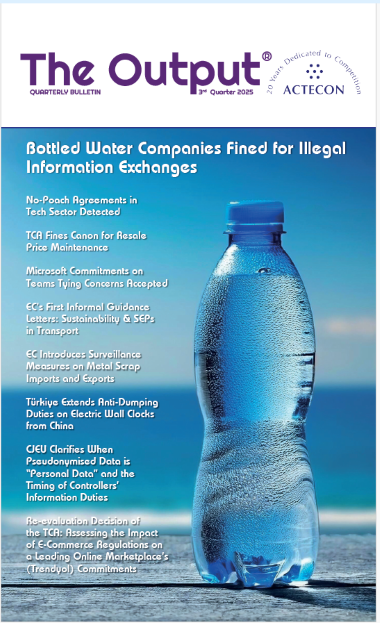The Turkish Competition Authority Concluded Its Preliminary Investigation Regarding Car Rental Services Market
| Competition Law

The Turkish Competition Authority Concluded Its Preliminary Investigation Regarding Car Rental Services Market
Authored by Erdem Aktekin, Helin Yüksel and Seda Eliri
On 31 January 2023, Turkish Competition Authority’s (“TCA”) decision dated 21 July 2022 and numbered 22-33/526-212 regarding a preliminary investigation into the car rental services market (the “Decision”) was published on the TCA’S official website. Back in 2020, the TCA started this preliminary investigation in order to determine whether the undertakings that are engaged in car rental activities violated Article 4 of Law No. 4054 on the Protection of Competition (“Competition Law”). Within this scope, the TCA conducted on-site inspections on the premises of twelve undertakings and took copies of more than a hundred findings. In the Decision, the TCA concluded that there was no evidence showing that undertakings operating in the car rental services market were party to an exchange of information which restricted competition, therefore, there was no need to launch a full-fledged investigation.
One of the significant aspects of the Decision concerns the findings of the TCA regarding the overall workings of the car rental services sector. Due to the fact that there is no sector-specific regulation and lack of legal barriers to entry, according to the TCA, it is not possible to determine the exact number of undertakings operating in the sector. Although the general service framework offered to the customers was of a similar nature; the contracts, the needs and demands of the customers requesting car rental caused wide differentiation among the activities carried out and the services provided. Thus, it is understood that the activities of each undertaking were somewhat classified within the framework of its own approach, and this resulted in distinctions observed in the market and with regards to sub-sections such as operational leasing, fleet leasing, long-term car rental, and long-term/short-term rental. In this context, the TCA chose to divide the activities observed in the sector into two main groups: short-term (daily) car rental and long-term (operational) car rental, and it was concluded that the relevant product market for the investigation should be taken as the “long-term car rental services market”.
Within the scope of the file, it has been observed from the documents obtained through the dawn-raids that some undertakings possessed information on car stock numbers, price offers, purchase numbers, and market shares of their competitors. Since the TCA believed such data/information may constitute competitively sensitive strategic information under certain conditions, these were analyzed in detail to see whether they were obtained through direct communication between the competitors.
At first, the TCA noted that no document was found that proved the price offers were shared directly between the competitors in an attempt to restrict competition. From the documents obtained during the on-site inspections, it is understood that customers commonly shared the price offers that they obtained from the competitors (or directly sent the offers they had received over phones and e-mails), and price information can also be obtained as a result of field studies that are common in the sector. It is observed that these correspondences were then shared within the receiving company and further correspondences between the employees clearly showed that this information was used to reduce their own price offers. The TCA concluded that these circulations of price offers among the competitors actually resulted in increasing competition rather than restricting it. To conclude, both the market research of the undertakings and the price information obtained through customers are used by the undertakings to (i) offer lower prices, (ii) ensure gaining new customers or (iii) prevent the loss of the existing customers, and ultimately (iv) take pro-competitive actions.
On a separate note, the TCA evaluated a correspondence between competitors including daily rental price lists of two investigated undertakings, a situation which at first sight may raise doubts regarding the exchange of price information between competitors. However, it was understood that the two undertakings were engaged in short-term car rental activities, and therefore, the exchange of price information between them and the undertakings active in long-term rental activities arose from the vertical relationship for the purpose of supplying replacement cars.
Another issue which was frequently encountered in the documents was the correspondence regarding market share information about other players. In their responses, the undertakings explained that the market share information was available through sector reports prepared by the association of undertakings. It was further emphasized that the retrospective and aggregated information is published publicly in the relevant reports, and both competitors and customers can access the reports equally, thus they do not lead to anti-competitive effects.
Finally, the TCA emphasized that the market structure was in itself not suitable for a restriction of competition which may result from possible exchanges of information. In this context, it is stated that it was not easy to fully understand the pricing behaviors of competitors even if their price information was readily available because of the following reasons:
- there are many players operating in the market, and therefore the market cannot be regarded as a concentrated market,
- it is difficult for undertakings to collude, since there were a number of factors that affected them differently with respect to costs they faced such as the effects of the chip crisis in the automotive industry, supply problems, raw material prices, and fluctuations in foreign currency. These resulted in constant fluctuations in the prices as undertakings reacted to different degrees according to these constantly fluctuating costs, and
- due to the differences in car segments in the market and variety in the services.
The preliminary investigation which was launched against twelve undertakings active in car rental activities concluded by the TCA after almost two years. At the end, since there was no evidence found showing that the undertakings were party to a direct anti-competitive exchange of information and therefore infringed Article 4 of Competition Law, the TCA concluded that there is no need to launch a full-fledged investigation.
Published by Concurrences on February 15, 2023






